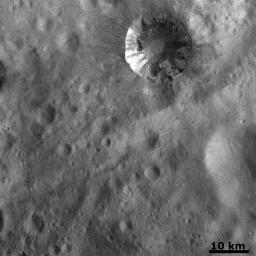
|
Fresh Crater with Dark and Bright Material
- Click the image above for a larger view
- Full-Res JPEG (1024 x 1024) (155.6 kB)
- Full-Res TIFF (1024 x 1024) (1.1 MB)
Caption:
This detail of a Dawn FC (framing camera) image shows a fresh scarp rimmed crater with a remarkable distribution of bright and dark material in its interior. Most of this bright and dark material originates from the crater rim but some originates much farther down the inwardly dipping crater walls. Especially curious is the left hand side of the crater where a layer of dark material crops out about half way down the crater wall, below the bright material which crops out from the crater rim. It is possible that under the surface of Vesta there are layers of bright and dark material, which become exposed due to the excavation of impact craters. The high resolution of this image also allows the pitted floor of this crater to become visible. Radial streaks of ejecta surround the crater and are superimposed on the older, densely cratered landscape. This landscape is identified as being older than the scarp rimmed crater because the craters it contains are older with less fresh, more eroded rims.
NASA's Dawn spacecraft obtained this image with its framing camera on October 2nd 2011. These images were taken through the camera's clear filter. The distance to the surface is 670km and the image resolution is about 63 meters per pixel.
Background Info:
More information about Dawn is online at http://www.nasa.gov/dawn and http://dawn.jpl.nasa.gov .
Cataloging Keywords:
| Name | Value | Additional Values |
|---|---|---|
| Target | 4 Vesta | |
| System | Main Belt | |
| Target Type | Asteroid | |
| Mission | Dawn | |
| Instrument Host | Dawn | |
| Host Type | Orbiter | |
| Instrument | Framing Camera (FC) | |
| Detector | ||
| Extra Keywords | Crater, Grayscale, Impact | |
| Acquisition Date | ||
| Release Date | 2011-10-09 | |
| Date in Caption | ||
| Image Credit | NASA/JPL-Caltech/UCLA/MPS/DLR/IDA | |
| Source | photojournal.jpl.nasa.gov/catalog/PIA14829 | |
| Identifier | PIA14829 | |
